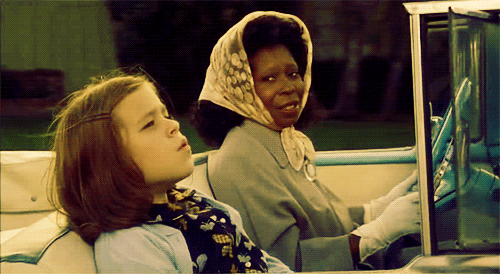An Approachable Beauty | The Casting of Whoopi Goldberg in “Corrina, Corrina” (1994)

"Corrina, Corrina," a heartfelt film released in 1994, explores the intersection of race, love, and family through the lens of an interracial relationship. The film, set in the 1950s, centers around Corrina Washington (Whoopi Goldberg), a Black woman hired by Manny Singer (Ray Liotta), a white widower, to care for his home and daughter, Molly. As Corrina becomes an integral part of their lives, she and Manny develop a romantic relationship that defies the racial norms of their time.
Positive Representation of Black Women

One of the most remarkable aspects of "Corrina, Corrina" is its positive representation of Black women. Corrina is portrayed as a nurturing, intelligent, and desirable woman. Unlike many films of its era, which often relegated Black women to stereotypical roles, "Corrina, Corrina" offers a narrative where a Black woman is valued and respected for her whole personhood. This aligns with the biblical view of the virtuous woman described in Proverbs 31:10-31, where her worth is emphasized: "She is far more precious than jewels" (Proverbs 31:10, ESV).
Corrina's character breaks the mold by being both relatable and admirable. She is depicted as someone who, despite the societal prejudices of the 1950s, commands respect and affection from those around her. Her relationship with Manny highlights that love and respect transcend racial boundaries, showcasing a healthy, loving relationship where both partners view each other as equals.
Jonesy
Jenny Davis
Corrina's Prevailing Love
Among other women vying for Manny's affection, it is Corrina who ultimately prevails. The film introduces Jonesy, a white housekeeper who is hired but subsequently fired after trying to seduce Manny. Jonesy's approach to winning Manny's affection is starkly contrasted with Corrina's genuine and sincere connection with him. The housekeeper's attempt to use seduction as a means to secure her place in Manny's life is portrayed as disingenuous and ultimately unsuccessful.
Additionally, Jenny Davis, a recently divorced woman, clearly expresses interest in Manny, seeing him as a potential next husband. Despite her clear intentions and perhaps more socially acceptable match, she too is unable to capture Manny's heart. This highlights that Manny's choice of Corrina is based on genuine affection and deep emotional connection rather than societal expectations and not merely physical attraction.
Corrina's triumph over these women underscores her worth and desirability, emphasizing that her qualities of kindness, intelligence, and authenticity are what truly capture Manny's heart. This resonates with the biblical portrayal of love and relationships, where inner beauty and character are valued above all else. As Proverbs 31:30 (ESV) states, "Charm is deceitful, and beauty is vain, but a woman who fears the Lord is to be praised."
Societal and Familial Rejection
The film also poignantly explores the rejection Corrina faces from Manny's mother, Eva, and the neighbor, Mrs. Murphy. Eva embodies the era's racial biases, finding it difficult to accept a Black woman as a suitable partner for her son. Her preference for Jenny highlights the superficial judgments based on race rather than the deeper qualities of love and compatibility.

On the other side, Corrina's sister, who prefers Anthony, a single Black man, for Corrina, reflects the internalized societal pressures within the Black community as well. Her rejection to Manny underscores the additional layer of complexity in interracial relationships, where both communities may harbor reservations and biases.
Challenges Faced by Interracial Couples
The film does not shy away from addressing the challenges that interracial couples face, particularly in a historical context. During the 1950s, interracial relationships were often stigmatized, and couples faced significant societal pressure and discrimination. In "Corrina, Corrina," these challenges are powerfully portrayed.
Corrina and Manny's relationship encounters opposition and skepticism from both the Black and white communities. This dual rejection is reflective of the societal reality of the time and remains relevant today. Interracial couples often navigate a complex landscape of acceptance and prejudice, making their relationships more resilient but also more challenging.

Casting Whoopi Goldberg: Shaping Perceptions of Black Women
Whoopi Goldberg is often celebrated not just for her acting talent but also for her unique and relatable presence. In "Corrina, Corrina," she embodies the beauty of an everyday Black woman that resonates with many who may not fit into the narrow, often Eurocentric, standards of conventional attractiveness portrayed in Hollywood.

Goldberg’s casting is a powerful statement that challenges the prevailing beauty norms and asserts that everyday Black women possess a distinct beauty and inherent worth. This portrayal is crucial because it validates the experiences and self-perceptions of countless women who see themselves reflected in Goldberg’s character. It sends a message that beauty and value are diverse and multifaceted. This choice is profoundly impactful for Black women who often face additional layers of scrutiny regarding their appearance. This positive representation can shift societal perceptions, encouraging a broader appreciation for the diverse beauty of everyday Black women.
Conclusion
"Corrina, Corrina" is a film that poignantly illustrates the complexities and beauty of interracial relationships. Through the lens of Corrina and Manny's relationship, the film challenges stereotypes, celebrates the worth of Black women, and acknowledges the societal hurdles interracial couples face. The positive representation of Corrina as a desirable and worthy woman resonates with the biblical affirmation of the inherent value and dignity of every individual.
In a world still grappling with issues of race and acceptance, "Corrina, Corrina" offers a timeless message of love's power to transcend barriers and the importance of recognizing and cherishing the worth of every person. The film's portrayal of Corrina, brought to life by Whoopi Goldberg, serves as a powerful reminder of the value and dignity of everyday Black women, challenging viewers to see them as worthy of love and respect.


